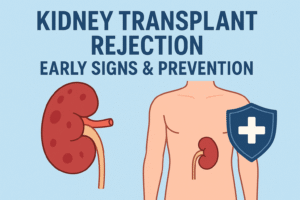GFR in kidney health isn’t some random lab code. It’s the scorecard for how well your kidneys are pulling waste out of your blood. When that number drops, you’re looking at early kidney function decline, even if you feel perfectly fine. Sometimes it’s just small stuff, tired more often, ankles puffing up, quiet kidney disease symptoms that are easy to brush off. Let it keep slipping, though, and you’re heading into different renal disease stages, each one tougher to manage. For people in Ardmore, OK, and Gainesville, TX, knowing where you stand? That’s the first step in staying ahead of it.
Understanding GFR in Kidney Health in Ardmore, OK, and Gainesville, TX
When you talk about GFR in kidney health, you’re talking about how well your kidneys are doing their cleanup job. A good number? Fine. A low one? That’s when kidney function decline might be starting, even before you notice anything. Maybe just a little swelling, maybe nothing obvious at all, those quiet kidney disease symptoms can hide. Doctors track GFR to sort out renal disease stages, from early warnings to more serious trouble. For residents of Ardmore, OK, and Gainesville, TX, it’s not just a lab figure; it’s like a heads-up, telling you when it’s time to pay closer attention.
Signs of Kidney Function Decline
Changes in GFR in kidney health can hint at trouble long before you feel unwell. Early kidney function decline often hides behind small things, swelling around the ankles, tiredness that doesn’t go away, or subtle kidney disease symptoms you might dismiss. Left unchecked, these changes can move you through the renal disease stages, making treatment harder. That’s why doctors don’t wait for obvious signs. In Ardmore, OK, and Gainesville, TX, they watch your numbers, looking for even slight shifts; thus, action can be taken before the damage becomes harder to reverse.
GFR and Renal Disease Stages
With GFR in kidney health, doctors can place you in one of the renal disease stages. Stage one might look fine on paper, yet there could be small kidney disease symptoms or quiet signs of trouble. As kidney function declines, you move through the stages, and each step makes recovery harder. It’s not just medical labeling. It’s how they decide what to do next: maybe just watch it closely, maybe start treatment to slow things down before real damage takes over. For those in Ardmore, OK, and Gainesville, TX, early awareness makes all the difference.
Why Ongoing Testing Matters
Regular checks on GFR in kidney health give doctors a clearer picture of how things are shifting over time. A slow drop can mean early kidney function decline, even without obvious kidney disease symptoms. If left unnoticed, you can slip into higher renal disease stages before anyone reacts. That’s the danger. Testing often means you catch those changes sooner, adjust your care, and give your kidneys a fighting chance. In Ardmore, OK, and Gainesville, TX, skipping it might only find out when damage has already become much harder to slow.
In the end, GFR in kidney health is more than just a line on a lab report. It’s the signal that tells you if your kidneys are keeping up, or if kidney function decline is quietly setting in. Those small kidney disease symptoms you might ignore. They can be clues. And moving into higher renal disease stages makes recovery harder. For residents in Ardmore, OK, and Gainesville, TX, knowing your GFR and checking it regularly matters. For more on protecting kidney function and understanding your results, visit SouthernOKC, a resource dedicated to keeping you informed and proactive about your long-term health.




